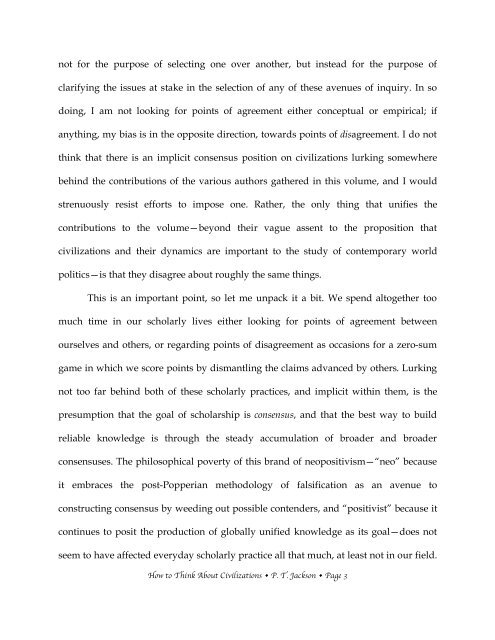How to Think About Civilizations - The Watson Institute for ...
How to Think About Civilizations - The Watson Institute for ...
How to Think About Civilizations - The Watson Institute for ...
Create successful ePaper yourself
Turn your PDF publications into a flip-book with our unique Google optimized e-Paper software.
not <strong>for</strong> the purpose of selecting one over another, but instead <strong>for</strong> the purpose of<br />
clarifying the issues at stake in the selection of any of these avenues of inquiry. In so<br />
doing, I am not looking <strong>for</strong> points of agreement either conceptual or empirical; if<br />
anything, my bias is in the opposite direction, <strong>to</strong>wards points of disagreement. I do not<br />
think that there is an implicit consensus position on civilizations lurking somewhere<br />
behind the contributions of the various authors gathered in this volume, and I would<br />
strenuously resist ef<strong>for</strong>ts <strong>to</strong> impose one. Rather, the only thing that unifies the<br />
contributions <strong>to</strong> the volume—beyond their vague assent <strong>to</strong> the proposition that<br />
civilizations and their dynamics are important <strong>to</strong> the study of contemporary world<br />
politics—is that they disagree about roughly the same things.<br />
This is an important point, so let me unpack it a bit. We spend al<strong>to</strong>gether <strong>to</strong>o<br />
much time in our scholarly lives either looking <strong>for</strong> points of agreement between<br />
ourselves and others, or regarding points of disagreement as occasions <strong>for</strong> a zero-sum<br />
game in which we score points by dismantling the claims advanced by others. Lurking<br />
not <strong>to</strong>o far behind both of these scholarly practices, and implicit within them, is the<br />
presumption that the goal of scholarship is consensus, and that the best way <strong>to</strong> build<br />
reliable knowledge is through the steady accumulation of broader and broader<br />
consensuses. <strong>The</strong> philosophical poverty of this brand of neopositivism—“neo” because<br />
it embraces the post-Popperian methodology of falsification as an avenue <strong>to</strong><br />
constructing consensus by weeding out possible contenders, and “positivist” because it<br />
continues <strong>to</strong> posit the production of globally unified knowledge as its goal—does not<br />
seem <strong>to</strong> have affected everyday scholarly practice all that much, at least not in our field.<br />
<strong>How</strong> <strong>to</strong> <strong>Think</strong> <strong>About</strong> <strong>Civilizations</strong> • P. T. Jackson • Page 3
















